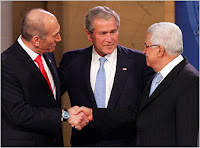President Bush just announced a joint decision between Israeli and Palestinian leaders to work toward a peace agreement by the end of 2008. The nature of the agreement, as well as what is at stake for Israel, is fairly confusing.
 Bernard Lewis presented a very well written commentary piece on the Annapolis Peace Conference in yesterday’s Wall Street Journal. The article, titled “On the Jewish Question,” is available on the WSJ.com website. Lewis writes:
Bernard Lewis presented a very well written commentary piece on the Annapolis Peace Conference in yesterday’s Wall Street Journal. The article, titled “On the Jewish Question,” is available on the WSJ.com website. Lewis writes:
Herewith some thoughts about tomorrow’s Annapolis peace conference, and the larger problem of how to approach the Israel-Palestine conflict. The first question (one might think it is obvious but apparently not) is, “What is the conflict about?” There are basically two possibilities: that it is about the size of Israel, or about its existence.
If the issue is about the size of Israel, then we have a straightforward border problem, like Alsace-Lorraine or Texas. That is to say, not easy, but possible to solve in the long run, and to live with in the meantime.
If, on the other hand, the issue is the existence of Israel, then clearly it is insoluble by negotiation. There is no compromise position between existing and not existing, and no conceivable government of Israel is going to negotiate on whether that country should or should not exist. [more]